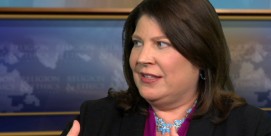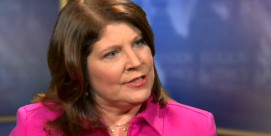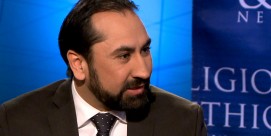In This Episode << SLIDE LEFT TO SEE ADDITIONAL SEGMENTS
Look Back 2009 Roundtable
BOB ABERNETHY, anchor: This is our annual look back at the major stories in religion and ethics during the year now coming to an end. We do this with the help of Kevin Eckstrom, the editor of Religion News Service; with E. J. Dionne of the Brookings Institution, the Washington Post, and Georgetown University; and with Kim Lawton, managing editor of this program. We begin with Kim’s reminder of the top news of 2009.
Click here to view Kim Lawton’s review of the top religion stories of 2009.
ABERNETHY: There was an enormous number of enormous issues, all at once confronting this country and especially President Obama.
KIM LAWTON, managing editor, Religion & Ethics Newsweekly: Exactly. I think he took office amid this great optimism and reality set in pretty quickly of the many complex things that need to be done.
ABERNETHY: E.J., at Oslo, when he received the Nobel Prize and spoke about going to war…
E.J. DIONNE, Brookings Institution: In fact, Obama could have evaded the paradox of a president who has just sent 30,000 troops into Afghanistan and getting the Nobel Peace Prize. Instead, he embraced that paradox, and he gave what I think is one of the most powerful arguments for a just war approach to foreign policy that we have heard from a president in a long time, perhaps ever. You could hear the echoes of Reinhold Niebuhr’s Christian realism. A lot of us have talked about how Obama is a Niebuhrian. I think you saw it very clearly there. He also, in a way, was bringing us really back to a kind of Truman-Roosevelt sort of liberalism out of the late 1940s, where there were echoes of the Four Freedoms in that talk. I think it’s rare that you get a president sort of laying out the moral assumptions behind his choices, but that’s what Obama did in that speech.
ABERNETHY: Christian realism—how do you define that?
DIONNE: Christian realism is sort of based on the idea that it’s the obligation of human beings to try to bring justice to a sinful world. It acknowledges human failure. It acknowledges the utopias cannot be built on this earth, but it asserts that human beings have the capacity to make things better, and that human beings have to make choices — some of them very, very difficult.
ABERNETHY: And that human beings have the capacity to make things worse, too.
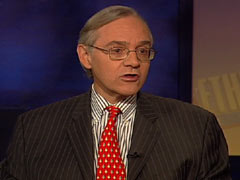 E. J. Dionne |
DIONNE: Quite. I think there was a kind of moral humility in that speech, where Obama was not celebrating the need to go to war. He was talking about it as a tragic necessity. That is, again, not something you often hear from a president of the United States, who often has to call men and women to war.
LAWTON: I find it interesting that while, as E.J. said, there is this philosophical, and some would say theological, underpinning in that speech, it really disappointed a lot of religious liberals who did not want to see a build-up in Afghanistan and were concerned about the president using some of these concepts to, in fact, bolster a war effort.
DIONNE: But I think that’s really an old argument between just war liberals and pacifists. Pacifists have a consistent ethic on war, but it’s not the same as the one held by just war theorists. What was interesting was that Obama said, “Look, I am in a different position than Gandhi or Martin Luther King, because I am the leader of a nation.” I thought that was a very interesting moral distinction he chose to make.
LAWTON: Again, the realism.
KEVIN ECKSTROM, Editor, Religion News Service: I think one of the interesting things that the Oslo speech pointed out was the comfort in the ability that this president has in speaking in religious terminology. You saw that when he was in Cairo speaking to the Muslims he invoked the Koran and the Prophet Muhammad. And when he was at Notre Dame speaking to the Catholics he talked about Catholic social teaching. And when he is accepting the Nobel Peace Prize, he is talking about war and peace and sin and human frailty. So this is a president who is very comfortable using religious language.
ABERNETHY: And you don’t get the impression—at least I don’t—that there is anything forced about this. It seems to come naturally.
ECKSTROM: That’s right. Part of the reason why he was able to speak, I think, so clearly to the Muslim world is because he has Muslims in his own family. So there is a naturalness and an authenticity there that I don’t think you see very often in very many politicians.
ABERNETHY: But in the Muslim world outside this country, how do we stand? After Cairo there was such enthusiasm for what Obama said, and then there was this escalation in Afghanistan.
ECKSTROM: It’s a little bit of a mixed bag, because I think American Muslims here at home felt very gratified by the things that he was saying. It’s important to note, I think, that in Cairo he was not just speaking to the Muslim world. He was not just speaking to Saudi Arabia and Egypt, but he was talking to the folks here at home, Muslims who have pretty much had to go underground for a good part of this decade, and now they are sort of re-emerging in political life I think he was speaking to them. But as we saw with Fort Hood, in the shootings there, they have some serious problems of their own that they’re going to have to deal with in terms of home-grown extremism.
DIONNE: By the way, it is intriguing that President Bush came under a lot of criticism for using religious language. In fact, in some ways, a more liberal or progressive president may be invoking religious language even more than Bush did, albeit in a very particular way. But on the Cairo speech, it got an enormously positive response from the Muslim world, and then the president ran head-on into the difficulties resolving the Israeli-Palestinian dispute. I think that was one of the real failures of the year for the president. Maybe it wasn’t something he could succeed at, but I think he had sort of expected the Israelis to do certain things It was probably unrealistic to expect that. Having done that and made some effective promises to the Palestinian leaders, they felt let down. So he really is, if not back to square one, awfully close. I think it’s going to be one of his real challenges in the coming year, to try to restart some process.
ABERNETHY: After the shootings at Fort Hood and after the five Muslim young men from northern Virginia ended up in Pakistan, apparently wanting to join the Al Qaeda, has there been some increase, Kim, in the concern that most people in this country have about Muslims in this country?
LAWTON: That’s the concern the Islamic community has. They’re very worried about how they’re being perceived outside, as well as being worried about what’s happening within their midst and among their own young people So I am hearing a lot of Muslim leaders, U.S. Muslim leaders, saying we need to do a better job of combating some of the hate speech that is out there. Especially online, they need to do a better job of talking about their view of Islam, which they think is being distorted by a lot of extremists. So they are very worried about how all of this is affecting not only the outward stuff, but their own internal problems as well.
DIONNE: When Fort Hood happened, I got an e-mail from this fine officer I’ve gotten to know, where he said, “This was a terrible, tragic problem” because, on the one side, clearly some folks, somewhere along the line, had fallen down on the job in protecting the troops from this shooter. On the other hand, he said, “I have troops under me who are Muslim, who are very loyal Americans, and we have to keep a balance here of preserving security for our troops without sort of throwing into one pot all of these Muslim American soldiers who are very loyal to the country.”
ABERNETHY: Let me turn your attention to some of the social issues of the year, especially abortion coming back with such strength, and that debate as part of the health care debate, and the issues around gay marriage, homosexuality. Talk about that, Kim.
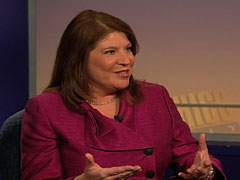 Kim Lawton |
LAWTON: There’s a lot to talk about. There was a lot of activity on both of those issues. Certainly, the issue of abortion, we saw that moving to the center, especially in the health care debate. Of course, some of the tensions were already heightened. You had the murder of Dr. Tiller in his church, a doctor who performed abortions. Then you had an abortion opponent who was murdered while holding anti-abortion signs. So some of the rhetoric and the tensions had already been heightened. I think in the health care debate you saw that issue really putting a big challenge on people that wanted to have health care reform, even the U.S. Catholic Bishops, who said, “We want to see health care reform , but not if in any way it includes funding for coverage of abortions.”
ECKSTROM: Abortion has always been one of those issues that’s been kind of a litmus test for politicians: How do you stand on that one issue? And that sort of translates into how people view your larger profile. But I think what was interesting this year was that it became a litmus test, if you’re a politician, for your respect for people of religious faith who don’t support abortion. So if you supported health care that included some sort of abortion provision, then all of a sudden you obviously didn’t respect people of faith who are opposed to it. So it became, I think, even more of a litmus test this year.
DIONNE: Especially about the health care fight, in a broad sense, both sides had agreed ahead of time that they weren’t going to fight about abortion, and then they had a fight about abortion. The agreement was neither side would use the health care debate to push beyond existing law, the Hyde Amendment, which essentially prohibits government funding for abortion except for a case of rape, incest, and where a mother’s life is at stake. But then they couldn’t agree on what it meant to preserve the status quo. The House passed the Stupak Amendment, which essentially said any insurance policy sold on the exchange that might get government subsidies, none of them could cover abortion. Then the Senate came up with another compromise which essentially said if you get coverage in your policy, you’re going to have to pay for it separately — a tiny amount of money. What’s amazing is they finally did seem to settle it. We’ll see this play out at the beginning of the year, but it shows how persistent this fight is when you can’t even agree on the definition of the status quo.
LAWTON: This has been a challenge for President Obama, who in his big speech at Notre Dame, for example, said we’re going to find common ground on abortion. Everybody was expecting a big statement or some kind of thing on common ground on abortion. I think the end of the year showed that it’s tough to find common ground there.
ECKSTROM: Even within your own party.
LAWTON: Exactly.
ABERNETHY: What about the gay issues, especially in the churches?
LAWTON: Looking at it in the religious denominations, it proved to be a huge challenge. Generally speaking, as more states legalized gay marriage, that put a challenge for religious clergy: Do you perform a same-sex wedding if your national denomination doesn’t approve of that? And so there were a lot of tensions at the local level for clergy. I think, on a denominational-institutional level, we saw the Evangelical Lutheran Church in America, a mainline denomination, lifting its ban on clergy who are in relationship. They only had allowed celibate gay clergy in the past. And, of course, the Episcopalians and the Anglicans are still fighting about this issue. This summer the US Episcopalians said gays and lesbians are eligible to be bishops. This is something the international Anglican Communion that the US church is part of said we don’t want to see you move forward on this. And the U.S. church said we’re moving forward anyway. Indeed, Los Angeles has elected a lesbian bishop. Her election must be still confirmed, but it has put enormous new tensions on the worldwide Anglican Communion.
ECKSTROM: The fights within the churches are really a proxy for a larger fight within society over this issue. We saw that this year over gay marriage. It’s hard to remember that this year saw the birth of gay marriage in Iowa, Vermont, New Hampshire, and Connecticut, and also the District of Columbia. So it’s not just that the churches are fighting about this, but they are fighting a version of a national fight.
ABERNETHY: In all this, what’s going on internationally? What’s going on with these social issues? It’s happening against the background of a recession that’s having profound effects on the churches, denominations, as well as on everybody else.
DIONNE: What’s striking about this year is that there was an occasion where we might have had a very large moral argument about the nature of capitalism, about what kind of capitalism do we want to have, what are the responsibilities of people in the finance sector. We had some of that debate. Pope Benedict came out with a very strong encyclical that, in some ways, put him to the left of President Obama. But I think we didn’t have the larger debate that you might have expected, partly, I think, because we were numb, numb from the economic troubles, desperate to make sure that we didn’t fall off the precipice into something much deeper. But I don’t think this is over yet. I think we are destined to have a larger moral debate about the nature of capitalism and how we want it to work.
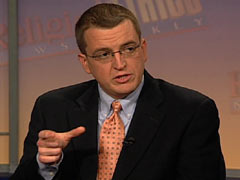 Kevin Eckstrom |
ABERNETHY: I’ve been astonished that there wasn’t more visible, and perhaps even violent, protest about the bailout of the big financial institutions at a time when, at the Main Street level, everyone was suffering so much. It seemed to me if it had been the days of the civil rights movement, or the anti-Vietnam War movement, there would have been people in the streets. That didn’t happen. Well, it did happen on the right, didn’t it?
DIONNE: I think you’ve got an essentially progressive president in power. There’s been some grumbling on the progressive side that President Obama hasn’t been tough enough on Wall Street. I think that grumbling will continue, and I think he’s going to respond to it. But given that you have a progressive president in power, it’s not surprising that this populism has taken a sort of conservative or right-wing form and is directed less against Wall Street than the government bailing out Wall Street. That just may be a natural result of where politics are at the moment.
ABERNETHY: Kevin, there’s some Vatican news, pope news.
ECKSTROM: There is. This was sort of, I think, a watershed year for the pope in that you saw the real contours of his papacy emerge. He is sort of doing things on his own timetable, for his own reasons, regardless of what people are going to say. So he’s going to welcome back traditionalists, even if one of them turns out to be a Holocaust-denying bishop. He’s going to find shelter for the Anglicans, even if it’s going to upset interfaith or ecumenical relations. And, as we ended the year, he’s going to move Pope Pius XII, the World War II pope who is accused of not doing enough to save Jews, he’s going to move him one step closer to sainthood. So it’s almost like either the pope doesn’t care what people are going to say, or he doesn’t know. But he sort of is doing things on his own timetable.
DIONNE: I think he’d make this a lot more palatable to a lot of people if he were also moving to canonize Pope John XXIII — one of the great heroes to progressive Catholics. I think one of the things it says about the organization of the Vatican, some of these things seem to happen when one part of the Vatican acted without another part of the Vatican knowing that it had acted. This was particularly the case with the Saint Pius XII Society, where there were parts of the Vatican that didn’t really realize they were moving this quickly. Some folks in the Vatican said we could have told him about the problem that he was going to have with this Holocaust-denying bishop, if someone had just told us that this was going on.
ECKSTROM: The Christian Unity Office really didn’t know about his outreach to the Anglicans to offer them shelter. So it’s almost like the left hand doesn’t quite always know what the right hand is doing.
LAWTON: That’s been a problem with the Vatican for a long time now. That’s not unique to this papacy. I think one of the differences is the personality. You see the differences between John Paul II and the great love and just positive feelings that he generated. Benedict doesn’t have that same kind of charisma, so I think he gets criticized for some of the same things that happened under the John Paul II papacy.
ABERNETHY: Let me ask you all a question. Did you see any signs in this year past that tell you something about how the whole religious enterprise is doing? Is it getting stronger? Is it getting weaker? Is it just kind of rolling along? Sixteen percent of people in the polls say they are unaffiliated. What do you see? Is there anything that can tell you about the health of religion in the United States?
DIONNE: Sometimes I think only God knows what the health of religion is in any given any country. I think what you’re seeing is that the old story is still true: that compared to other wealthy, industrialized countries we are still an exceptionally religious nation. But I think you’re also seeing, in some of the surveys, particularly among young people, perhaps the rise of a certain amount of secularism, or perhaps just disaffiliation from religious traditions. Young people are often less engaged in religious activity than older people, but this seems to be a change over time. I think that’s going to be something to watch, because you may have among young people a kind of sorting out that had not happened among older people. You do have a very significant number of highly religious young people, but some other young people who might in the past have been believing doubters or doubting believers, but still engaged in religious institutions, are now pulling back altogether. At least that’s a hypothesis that I think we’re going to follow for a while.
LAWTON: The old categories don’t fit as strongly as they used to. People are moving around a lot more. That doesn’t necessarily they’re becoming less religious. Even the unaffiliated very often are deeply spiritual or even deeply religious; just not within a particular box that the old categories used to put them in.
ABERNETHY: As you look back, let me ask you whether you see some things from your perspective now that didn’t seem to get the attention when they were happening that they deserve, they were underreported.
ECKSTROM: There are two very interesting cases in Oregon and in Wisconsin about faith-healing deaths, where children who were denied medical care died and their parents were put on trial. In Wisconsin, the parents were sentenced to probation; in Oregon, the parents basically got off. And there is a third case coming up in 2010 in Oregon. But there is a really interesting clash between personal beliefs and public responsibility, and it’s not going away, so there’ll be more to watch on that.
DIONNE: I think the activities of President Obama’s faith-based office, how he’s changed and hasn’t changed what President Bush did in this area, is probably an underreported story, but it is underreported because I think this is exactly the way the administration wants it. I think that they have been very determined, in the first year, not to make waves in this area, to be reassuring to people, and so the underreporting of this story is probably a victory for the administration.
LAWTON: I really watched a growing religious coalition, a very diverse coalition, on nuclear nonproliferation. It’s not something people really paid a lot of attention to, but there are evangelicals who are taking this on as an issue, sort of like they did on the environment. I am seeing the same thing, mainline denominations, even the Catholic Church and evangelicals coming together saying we are really worried about this issue.
ABERNETHY: Thanks to Kim Lawton and to Kevin Eckstrom and E. J. Dionne. A wonderful discussion. Thanks very much. Happy New Year to you and to our viewers.


